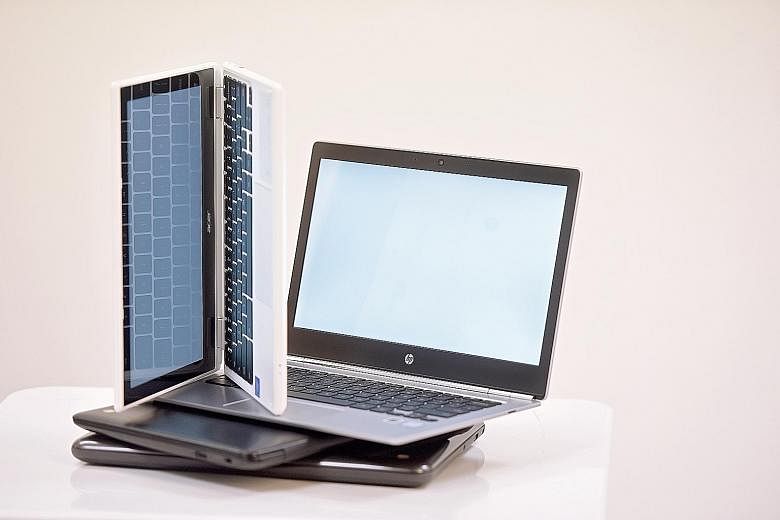Chromebooks could be seen everywhere in the classrooms of Yusof Ishak Secondary School for three days at the end of last month. Designated "Chromebook Day", Secondary 1 to 3 students used laptops that run on the ChromeOS operating system for lessons.
E-Learning Day followed and students could opt to stay at home to complete assignments using their Chromebooks. According to a school spokesman, students "enjoyed e-learning as it encouraged them to be self-directed learners".
Yusof Ishak Secondary is among a handful of local schools that use Chromebooks in classrooms.
Another one is Punggol Secondary School. About 35 per cent of its students use Chromebooks as part of the school's one-to-one computing initiative to enhance learning through collaboration and self-directed activities. The others use Windows or Apple computers.
"Students use their Chromebooks or learning devices to submit their responses on-site through Web apps like Linoit or Padlet, while teachers and peers can provide feedback to students instantaneously," said Mr Kelvin Lee, who teaches biology and geography at the school.
-
CHROMEBOOK FAQs
-
1 WHAT ARE CHROMEBOOKS?
They are laptops that run the lightweight ChromeOS operating system with the Chrome browser interface. They have limited internal storage (up to 64GB). Instead, cloud storage (for instance, 100GB Google Drive for two years) is usually bundled. Security and feature updates are also automatically pushed to Chromebooks
2 WHAT SOFTWARE CAN I RUN ON CHROMEBOOKS?
Chromebooks are built to run Web-based apps that operate inside its Chrome browser. Newer models have support for the same Android apps that run on Android phones and tablets, via the Google Play Store.<NO1>, though<NO> This feature is still in beta testing, though.
3 CAN I USE THEM WITHOUT AN INTERNET CONNECTION?
Early Chromebooks needed to be connected to a Wi-Fi network all the time, and were severely handicapped without a connection. But Google and other developers have since added offline functionality for some apps, including Gmail and Google Docs.
4 HOW MUCH DO THEY COST?
They typically cost from $300 to $500, though some PC makers have also launched higher-end models that are over $1,000.
5 WHERE CAN I BUY THEM?
They are available directly from PC makers via their websites.
Both schools are the exception rather than the norm. Despite the growing popularity of Chromebooks in schools in the United States, schools here are slow to adopt the low-cost laptops.
In the US, Chromebooks even outsold Apple computers in Q1 2016, thanks to the US education market, according to market-research firm IDC. More than 10 million Chromebooks were sold worldwide last year, 40 per cent more than in 2015.
Outside of the US, Chromebooks have had mixed success in education. A Futuresource report said Sweden was the only country where Chromebooks were the top-selling device in schools last year.
"In the Asia-Pacific, we have seen success stories only in Australia and New Zealand. Chrome shipments for education remain very small in Singapore," said IDC research manager Maciek Gornicki.
The Ministry of Education (MOE) does not track Chromebook usage in local schools. "Schools are given the autonomy and discretion to experiment with new devices, as long as these are appropriate for learning needs," said an MOE spokesman.
Singapore is "a very Windows (heavy) country", said Google's vice-president of product management, Mr Caesar Sengupta, because "we adopted computing before many other countries, so a lot of our schools and government agencies use Windows devices".
However, the Government's move to delink Internet access from computers used officially by public servants has resulted in plans to buy low-cost Web-surfing devices, including Chromebooks. Google said that more than 1,000 Chromebooks are now in use at more than 10 government agencies.
"We are starting to see good traction in schools, even though we haven't expressly pushed Chromebooks here," Mr Sengupta said.
Chromebooks were initially sold at retail outlets here in 2013. But they were poorly received and subsequently available only if you contact the manufacturer directly.
But there are signs of a comeback. Newstead Technologies started selling Chromebooks last year at the HP Store at Marina Square, while reseller GSA plans to launch a Web portal at the end of the month to sell them to the public.
"The big thing we're trying to tell the manufacturers is that there is enough consumer demand now to bring them back into the consumer space," said Mr Sengupta.
A new feature to run Android apps on Chromebooks may boost consumer adoption. All new Chromebooks launched this year will support the Google Play Store - older models will gradually get this feature, too. This move tackles the oft-repeated criticism that there are limited apps for Chromebooks.
New convertible Chromebooks with touchscreens have already been launched. The next version of Android will also have better keyboard support for Android apps.
Mr Gornicki was more cautious: "Introducing Google Play to Chromebooks will definitely make them more interesting to consumers. However, it is too early to say that it will be a game changer."


